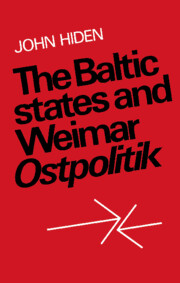Book contents
- Frontmatter
- Contents
- Introduction
- PART I THE POLITICS OF PEACEMAKING 1919–20
- PART II TRADE AND FOREIGN POLICY 1921–3
- PART III WEIMAR REVISIONISM AND BALTIC SECURITY 1923–33
- 5 Randstaatenpolitik
- 6 The politics of arbitration: Locarno and the Baltic
- CONCLUSIONS
- Map
- Tables
- Abbreviations
- Notes
- Bibliography
- Index
6 - The politics of arbitration: Locarno and the Baltic
Published online by Cambridge University Press: 22 September 2009
- Frontmatter
- Contents
- Introduction
- PART I THE POLITICS OF PEACEMAKING 1919–20
- PART II TRADE AND FOREIGN POLICY 1921–3
- PART III WEIMAR REVISIONISM AND BALTIC SECURITY 1923–33
- 5 Randstaatenpolitik
- 6 The politics of arbitration: Locarno and the Baltic
- CONCLUSIONS
- Map
- Tables
- Abbreviations
- Notes
- Bibliography
- Index
Summary
The events of 1923 proved beyond doubt the force of Wipert von Blücher's judgement, that ‘the problem of the Baltic, because of the present allocation of its shores and the way in which this came about, is closely linked with the Versailles question and the Eastern question’. The Baltic arena therefore also provides an opportunity to reconsider from another vantage-point the policies of Gustav Stresemann, a man whose name has frequently been used to describe an era of critical importance in European diplomacy. The immense literature on Germany's celebrated Foreign Minister has not fully resolved the central interpretative problem of his relationship to Hitler's foreign policy because the Weimar Republic's most famous personality died at the very time when Germany was lurching once more towards an overtly aggressive stance in Europe. What Stresemann might have done had he lived longer is a fascinating question, but the present chapter seeks to give due attention to the comparative international context in which Stresemann actually operated. This is not to revert to the simplistic notion of Stresemann as a ‘good European’. Rather, it is to recognize that his impeccable nationalist pedigree and his record as an annexationist in the First World War did not preclude his developing more constructive policy initiatives with inherent promise for European stability.
It is not without interest that his own political career-path from wartime annexationist to Vernunftrepublikaner – a process where the 1923 crisis exercised a formative influence – paralleled the development of Weimar–Baltic relations from intervention to collaboration.
- Type
- Chapter
- Information
- The Baltic States and Weimar Ostpolitik , pp. 142 - 170Publisher: Cambridge University PressPrint publication year: 1987



